Are you dreaming of vibrant markets, stunning architecture, and the allure of the Sahara Desert? Travel To Morocco offers an unforgettable experience, and SIXT.VN is here to make your journey seamless. We provide expert travel advice, convenient airport transfers, and a wide selection of hotels and tours tailored to your preferences. Let’s explore why Morocco should be your next destination and how SIXT.VN can help you plan the perfect trip.
1. Do I Need a Visa to Travel to Morocco?
It depends on your nationality. Citizens of the United States, Canada, the United Kingdom, European Union countries, Australia, New Zealand, and many other countries do not need a visa for stays of up to 90 days when they travel to Morocco. According to the Moroccan Ministry of Foreign Affairs, this visa-free entry is designed to boost tourism and facilitate easier travel. Ensure your passport is valid for at least six months beyond your planned stay. This regulation is strictly enforced to avoid any potential issues upon arrival, ensuring a smooth start to your Moroccan adventure.
2. Where Exactly is Morocco Located?
Morocco is situated in the northwestern corner of Africa, just south of Spain. Its unique location provides a blend of African, European, Arab, and Berber cultures. According to geographical studies, Morocco’s strategic position has historically made it a crossroads of civilizations. This has significantly influenced its rich cultural heritage. Its proximity to both the Atlantic Ocean and the Mediterranean Sea also contributes to its diverse landscapes and climates, making it a fascinating destination for travelers from around the globe.
3. What is the Best Way to Travel to Morocco?
The most common way to travel to Morocco is by air. Casablanca Airport (CMN) and Marrakech Menara Airport (RAK) are the major international airports servicing many major airlines, including Delta, American Airlines, Emirates, British Airways, and Air Canada. According to recent statistics from the Moroccan Airports Authority, these airports handle millions of passengers each year, reflecting their importance as entry points to the country. You can also reach Morocco by ferry from Spain, which takes from 1 hour and 30 minutes to 36 hours depending on the route.
For those looking for a convenient start to their journey, SIXT.VN provides reliable airport transfer services. We ensure a smooth transition from the airport to your hotel, allowing you to begin your adventure without any transportation hassles.
4. How Can I Get Around Morocco Efficiently?
Once you travel to Morocco, you have several transportation options: trains, buses, taxis, and domestic flights. Morocco’s rail network is comfortable and reliable, connecting major northern cities affordably. Buses are available but tend to be slower and sometimes overcrowded. Taxis come in two types: petit taxis for local city travel and grand taxis for longer distances between cities.
According to a report by the National Railway Office of Morocco, the train system is frequently used by both locals and tourists. For a convenient and reliable option, consider using SIXT.VN’s car rental services to explore Morocco at your own pace.
5. When is the Best Time to Travel to Morocco?
The best times to travel to Morocco are during the spring (March to May) and fall (September to November). The weather is pleasant, avoiding the extreme heat of summer and the cooler temperatures of winter. According to the Moroccan National Tourist Office, these months offer the most comfortable climate for exploring the country’s diverse landscapes and cultural sites. However, you should plan your trip around Ramadan if you prefer to avoid closures during the daytime.
6. How Will Religious Holidays Impact Travel to Morocco?
Morocco’s official religion is Islam, and while most religious holidays won’t significantly affect your visit, Ramadan is a notable exception. Ramadan typically lasts 30 days, occurring between March and May, during which Muslims fast from dawn until sunset. As a result, many local restaurants and cafes are closed during the day. However, experiencing Morocco during Ramadan can be rewarding, with vibrant celebrations after sunset. It’s advisable to check the Ramadan dates each year to plan accordingly and respect local customs.
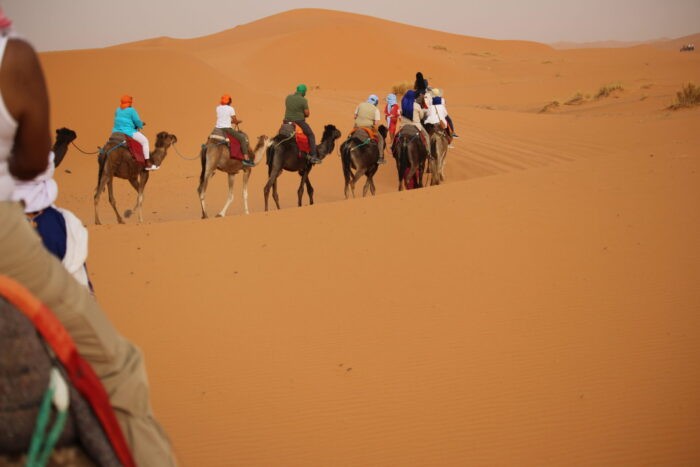 Sunset view during a camel ride adventure in Sahara Desert
Sunset view during a camel ride adventure in Sahara Desert
7. What is the Weather and Climate Like When I Travel to Morocco?
The climate in Morocco varies significantly depending on the region. Northern cities like Casablanca and Tangier enjoy a Mediterranean climate with mild, wet winters and hot, dry summers. Average temperatures in Casablanca range from 55 °F (13 °C) in winter to 73 °F (23 °C) in summer. In contrast, inland cities such as Marrakech and Fes experience more extreme temperatures. Marrakech can reach average summer temperatures in the 90s, while winter temperatures average around 54 °F (12 °C). Rainfall is most common from November to March, particularly in coastal areas.
8. What Languages are Spoken in Morocco?
Morocco has two official languages: Modern Standard Arabic and Standard Moroccan Berber. However, Moroccan Arabic (Darija) and various Berber dialects are more commonly spoken. French is also widely used due to Morocco’s history as a French protectorate.
While English isn’t widely spoken, most people in the tourism industry have a basic understanding of it. To enhance your experience, learning a few basic Arabic or French phrases can be very helpful and appreciated by locals.
9. What Currency Does Morocco Use, and How Do I Handle Money?
The currency in Morocco is the Moroccan Dirham (MAD). While some establishments, especially in tourist areas, may accept credit cards (excluding American Express), cash is widely preferred, particularly in smaller shops and souks. It is advisable to withdraw Dirhams from ATMs upon arrival, as they often offer decent exchange rates. According to financial analysts, being prepared with local currency can also aid in negotiating prices in markets.
10. What is Considered Appropriate Attire in Morocco?
Modest dressing is common in Morocco, particularly for women, in accordance with Muslim customs. It is advisable to wear clothing that covers the chest and shoulders, and lightweight pants or skirts that cover the knees. When visiting mosques, it is essential to cover your shoulders, chest, and knees. Head coverings are not mandatory but bringing a scarf is a good idea. In Marrakech, more casual attire is acceptable. Be sure to remove shoes before entering mosques and carry a bag for them.
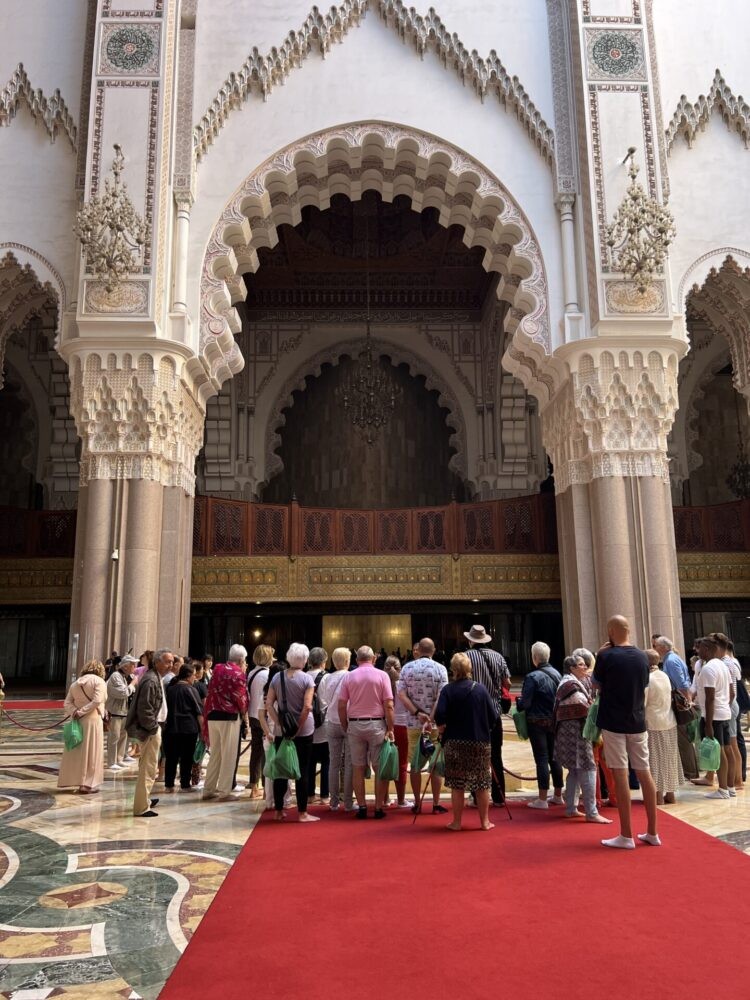 Exterior view of Hassan II Mosque in Casablanca
Exterior view of Hassan II Mosque in Casablanca
11. Where Should I Stay When I Travel to Morocco?
Riads are a popular accommodation choice in Moroccan cities. These traditional Moroccan houses or palaces feature interior courtyards or gardens, providing a tranquil escape from the bustling city streets. Many riads are located within the medinas, offering convenient access to dining and shopping. Alternatively, hotels and resorts outside the medina provide a more peaceful environment. For the best experience, ensure to check reviews and choose accommodations that suit your preferences.
12. What are the Must-Visit Destinations When I Travel to Morocco?
Morocco offers a wealth of destinations, each with its unique charm. Here are some top recommendations:
-
Casablanca: A modern city with historical touches, known for the Hassan II Mosque and Mohamed V Square.
-
Fes: An ancient and historic city with a sprawling Medina, the Royal Palace, and Madrasa Bou Inania.
-
Merzouga: A tranquil town in the Sahara Desert, ideal for camel rides, glamping, and exploring Erg Chebbi dunes.
-
Dades Valley/Dades Gorge: A scenic valley in the Atlas Mountains, offering stunning landscapes and Berber culture.
-
Marrakech: A vibrant city blending tradition and modernity, featuring the Koutoubia Mosque, Jemaa el-Fnaa square, and Jardin Majorelle.
13. What is There to See and Do in Casablanca?
Casablanca, though not the official capital, is Morocco’s bustling economic center. It offers a blend of modern and historical attractions. Key highlights include:
-
Hassan II Mosque: One of the world’s largest mosques, open to non-Muslims. Its intricate design and seaside location make it a must-see. According to official records, its minaret stands at 210 meters, making it one of the tallest religious structures in the world.
-
Mohamed V Square: A central hub where locals gather, offering a taste of the city’s vibrant atmosphere.
-
Museum of Moroccan Judaism: This museum provides insight into the 2,000-year history of the Jewish community in Morocco, offering a unique perspective on the country’s diverse heritage.
14. What Makes Fes a Must-Visit Destination?
Fes is known for its ancient history and well-preserved cultural heritage, offering a stark contrast to the modernity of Casablanca. Its highlights include:
-
Royal Palace: While the interior is not accessible, the stunning seven front gates provide a glimpse into Moroccan craftsmanship.
-
Jewish Cemetery: With its uniquely shaped white tombs, this expansive cemetery holds historical significance and offers a tranquil atmosphere.
-
Madrasa Bou Inania: Founded in the 14th century, this Muslim learning institute features stunning architecture, including green tiles and marble columns.
-
Borj Nord: This 16th-century fort houses the Museum of Arms, displaying thousands of historical pieces, including a cannon used in a 16th-century war.
-
Medina of Fes: One of the largest and most complex medinas in Morocco, offering an authentic cultural experience. It is easy to get lost in the maze-like streets, so hiring a guide is advisable.
15. What Adventures Await in Merzouga?
Merzouga is a small town on the edge of the Sahara Desert, serving as a gateway to the stunning Erg Chebbi dunes. Popular activities include:
-
Glamping in the Merzouga Desert: Experience the magic of the Sahara with a night in a luxury camp under the stars. Enjoy live music, traditional cuisine, and breathtaking views.
-
Camel Rides: Traverse the sand dunes on a camel and witness the stunning desert sunset.
-
Dayet Srji: Visit this salt lake west of Merzouga to see flamingos and other migratory birds.
16. What Can I Experience in Dades Valley and Dades Gorge?
Nestled in the Atlas Mountains, Dades Valley offers stunning natural beauty and cultural experiences. Key attractions include:
-
Auberge Chez Pierre Hotel: A charming hotel in Boumalne Dades known for its elegant interiors and modern amenities.
-
Dades Valley Exploration: Discover the valley’s towering cliffs, fertile gardens, and welcoming locals.
-
Rose Valley and Kelaat M’Gouna: Visit these areas to immerse yourself in the beauty of Morocco’s desert region and Berber culture.
17. What are the Key Attractions in Marrakech?
Marrakech is a city that seamlessly blends tradition and modernity, offering a wide array of attractions:
-
Koutoubia Mosque: The largest mosque in Marrakech, known for its impressive minaret, which serves as a major city landmark.
-
Jemaa el-Fnaa: A bustling square that comes alive in the evening with street performers, musicians, and food stalls. According to UNESCO, this square is a unique example of cultural heritage.
-
Bahia Palace: An opulent 19th-century palace with tranquil courtyards, lush gardens, and intricate fountains.
-
Jardin Majorelle: A lush botanical garden with exotic plants and the iconic “Majorelle Blue” color, formerly the residence of Yves Saint Laurent.
-
YSL Museum: Featuring exhibits of Yves Saint Laurent’s work, including garments, sketches, and accessories.
18. What Traditional Foods and Beverages Should I Try in Morocco?
Moroccan cuisine is rich and flavorful, with aromatic spices and unique dishes. Must-try items include:
-
Couscous: The national dish, traditionally served with a stew of meat and vegetables.
-
Harira: A soup made from tomatoes, lentils, chickpeas, and lamb, often served during Ramadan.
-
Tagine: A dish cooked in a clay pot, typically with slow-cooked meat, vegetables, and spices.
-
Pastilla: A savory meat pie with a poultry or seafood filling, flavored with sugar, cinnamon, and almonds.
-
Mint Tea: The most popular beverage in Morocco, served hot and made with fresh mint and sugar.
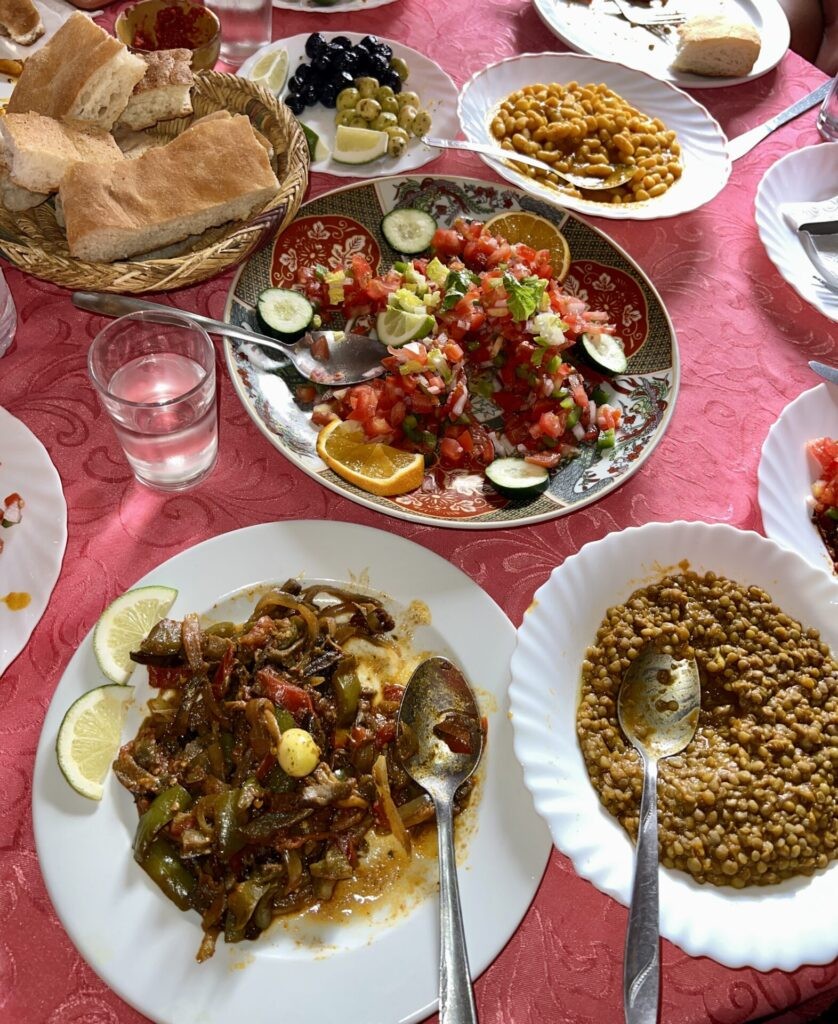 Assortment of Moroccan appetizers served warm and cold
Assortment of Moroccan appetizers served warm and cold
19. What Should I Know About Shopping in Morocco?
Morocco offers a fantastic shopping experience with a wide range of goods. Budget accordingly! Popular items include:
- Leather goods
- Home goods
- Pottery
- Furniture
- Jewelry
- Clothing
Haggling is a common practice in Moroccan markets, so be prepared to negotiate prices.
20. What Unique Experiences Does Morocco Offer?
Morocco is known for its rich history, culture, and diverse landscape. Unique experiences include:
-
Exploring the Medina of Fes: Get lost in the maze-like streets of one of the world’s largest urban pedestrian zones.
-
Visiting the Chouara Tanneries: Witness the traditional process of dyeing animal skins and hides.
-
Enjoying a Cooking Class: Learn to prepare traditional Moroccan dishes.
-
Relaxing in a Hammam: Experience a traditional Moroccan spa treatment.
21. How Can SIXT.VN Help Me Plan My Trip to Morocco?
SIXT.VN offers a range of services to ensure your trip to Morocco is seamless and enjoyable. We provide:
-
Expert Travel Advice: Personalized recommendations for your itinerary.
-
Airport Transfers: Convenient and reliable transportation from the airport to your hotel.
-
Hotel Booking: A wide selection of hotels to suit your budget and preferences.
-
Tour Bookings: Guided tours to explore the best of Morocco’s cities and landscapes.
-
Car Rentals: Freedom to explore Morocco at your own pace.
22. Why Should I Choose SIXT.VN for My Morocco Travel Needs?
Choosing SIXT.VN means you benefit from our expertise, convenience, and commitment to customer satisfaction. We ensure your travel plans are hassle-free, allowing you to focus on enjoying your Moroccan adventure. Our services are designed to meet the unique needs of every traveler, ensuring a memorable and stress-free experience.
23. What Should I Pack for My Trip to Morocco?
Packing for a trip to Morocco requires considering the climate, cultural norms, and planned activities. Essential items include:
- Lightweight, modest clothing
- Comfortable walking shoes
- Sunscreen
- Hat
- Sunglasses
- Scarf (for visiting religious sites)
- Adapter for electrical outlets
- Any necessary medications
24. Are There Any Specific Customs I Should Be Aware Of?
When traveling to Morocco, being mindful of local customs will enhance your experience and demonstrate respect for the culture. Key customs to be aware of include:
-
Greetings: Greet people with a handshake and a smile. In more traditional settings, avoid physical contact between men and women unless they are family.
-
Dining: Use your right hand when eating. Avoid wasting food, as it is considered disrespectful. If invited to someone’s home, it is customary to bring a small gift.
-
Bargaining: Bargaining is common in markets, but do so respectfully and with a friendly attitude.
-
Photography: Always ask for permission before taking photos of people.
-
Public Behavior: Avoid public displays of affection and dress modestly, especially in rural areas and religious sites.
25. How Safe is It to Travel to Morocco?
Morocco is generally considered a safe country for tourists. According to the U.S. Department of State, crime rates are relatively low, but petty theft can occur in crowded tourist areas. It is advisable to take standard precautions, such as:
- Keeping valuables secure
- Being aware of your surroundings
- Avoiding walking alone at night in poorly lit areas
- Using reputable transportation services
Following these guidelines will help ensure a safe and enjoyable trip to Morocco.
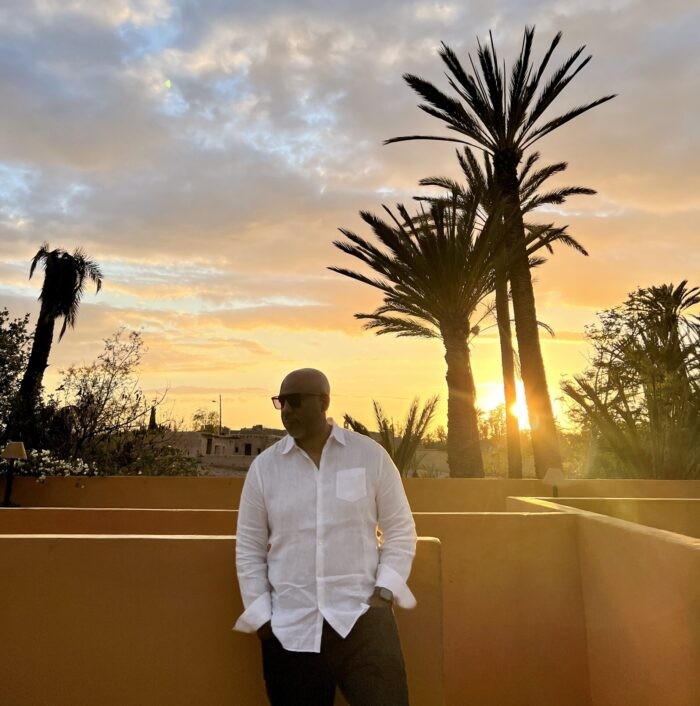 Sunset in Morocco and Parrish enjoys the view at rooftop in Jnane Tamsna
Sunset in Morocco and Parrish enjoys the view at rooftop in Jnane Tamsna
26. Can I Drink the Tap Water in Morocco?
It is generally not recommended to drink tap water in Morocco. It is safer to drink bottled water, which is readily available in stores and restaurants. You should also use bottled water when brushing your teeth. To minimize plastic waste, consider bringing a reusable water bottle and a water purifier.
27. Are There Any Specific Health Precautions I Should Take Before Traveling to Morocco?
Before traveling to Morocco, consult your doctor about recommended vaccinations and health precautions. Common recommendations include:
- Ensuring routine vaccinations are up to date
- Considering vaccinations for hepatitis A and typhoid, especially if you plan to eat street food or travel to rural areas
- Protecting yourself from mosquito bites, as malaria and dengue fever can be present in some regions
It is also advisable to bring a basic first-aid kit with essentials like pain relievers, diarrhea medication, and antiseptic wipes.
28. What Should I Know About Internet Access in Morocco?
Internet access is available in most cities and tourist areas in Morocco. Many hotels, cafes, and restaurants offer Wi-Fi. You can also purchase a local SIM card with a data plan, which can be a cost-effective option if you need consistent internet access. Ensure your phone is unlocked before purchasing a local SIM card.
29. What Kind of Electrical Outlets are Used in Morocco?
Morocco uses Type C and Type E electrical outlets. The standard voltage is 220 V, and the frequency is 50 Hz. If your devices use a different voltage or plug type, you will need to bring a voltage converter and/or a plug adapter.
30. What are Some Useful Arabic Phrases to Know?
Learning a few basic Arabic phrases can enhance your interactions with locals and show respect for their culture. Some useful phrases include:
- Hello: As-salamu alaykum
- Goodbye: Ma’a as-salama
- Thank you: Shukran
- You’re welcome: Afwan
- Yes: Na’am
- No: La
- Please: Min fadlik
- How much?: Bikam hatha?
31. What Are the Best Souvenirs to Buy in Morocco?
Morocco is a treasure trove of unique souvenirs. Some of the best items to consider include:
- Leather goods: Bags, shoes, and jackets
- Argan oil: A cosmetic oil native to Morocco
- Spices: Saffron, cumin, and ras el hanout
- Pottery: Tagines, bowls, and plates
- Textiles: Carpets, scarves, and blankets
- Metalwork: Tea sets, lanterns, and trays
32. What Are the Cultural Differences I Should Be Aware Of?
Understanding and respecting cultural differences is essential for a positive travel experience. Key cultural differences to be aware of in Morocco include:
-
Hospitality: Moroccans are known for their warm hospitality. Accepting offers of tea or coffee is a sign of respect.
-
Personal Space: Moroccans may stand closer than what you are accustomed to.
-
Ramadan: Be respectful of those who are fasting during Ramadan. Avoid eating, drinking, or smoking in public during fasting hours.
-
Public Displays of Affection: Public displays of affection are generally frowned upon, especially in more conservative areas.
-
Tipping: Tipping is customary in Morocco for good service. A tip of 10-15% is generally appreciated in restaurants and cafes.
33. How Can I Contribute to Sustainable Tourism in Morocco?
Contributing to sustainable tourism helps preserve Morocco’s natural and cultural heritage. Here are some ways to travel responsibly:
-
Support local businesses: Shop at local markets, eat at family-run restaurants, and stay in locally owned accommodations.
-
Respect the environment: Avoid littering, conserve water and energy, and choose eco-friendly tour operators.
-
Learn about the culture: Engage with locals, learn about their traditions, and show respect for their way of life.
-
Avoid purchasing endangered species products: Refrain from buying souvenirs made from endangered plants or animals.
-
Travel during the off-season: This helps to distribute tourist income more evenly throughout the year and reduces overcrowding during peak seasons.
34. What Are the Best Spots for Photography in Morocco?
Morocco offers endless opportunities for stunning photography. Some of the best spots include:
- Hassan II Mosque (Casablanca): The intricate architecture and ocean views.
- Medina of Fes: The maze-like streets and vibrant markets.
- Erg Chebbi (Merzouga): The sweeping sand dunes at sunrise or sunset.
- Dades Valley: The dramatic landscapes and kasbahs.
- Jardin Majorelle (Marrakech): The lush gardens and vivid colors.
- Chefchaouen: The blue-washed buildings.
- Ait Benhaddou: The ancient fortified village.
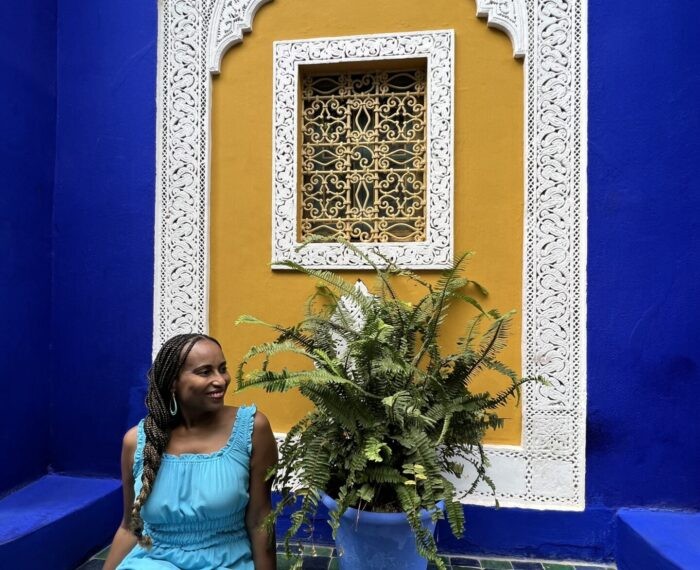 Nadeen stands inside Majorelle Jardin
Nadeen stands inside Majorelle Jardin
35. What Are the Best Travel Insurance Options for Morocco?
Travel insurance is essential for protecting yourself against unforeseen circumstances. When choosing travel insurance for Morocco, consider the following:
-
Medical coverage: Ensure the policy covers medical expenses, including hospitalization and emergency evacuation.
-
Trip cancellation/interruption: Look for coverage that protects you if you need to cancel or cut short your trip due to illness, injury, or other covered reasons.
-
Lost or stolen belongings: Choose a policy that covers the loss or theft of your luggage, passport, and other valuables.
-
24/7 assistance: Ensure the insurance provider offers 24/7 customer service to assist you with any issues that may arise during your trip.
36. How Can I Stay Connected with SIXT.VN During My Trip to Morocco?
SIXT.VN is dedicated to providing you with ongoing support throughout your trip to Morocco. You can stay connected with us through various channels:
- Website: Visit our website SIXT.VN for travel information, booking services, and customer support.
- Hotline/WhatsApp: Reach out to us via our hotline or WhatsApp at +84 986 244 358 for immediate assistance.
- Email: Contact us via email for any inquiries or support requests.
- Social Media: Follow us on social media for travel inspiration, tips, and updates.
We are here to help you every step of the way, ensuring a smooth and enjoyable trip to Morocco.
37. What kind of guided tours are available with SIXT.VN to explore Morocco?
We offer a variety of guided tours to explore Morocco. You can enjoy historical tours, cultural tours, desert adventures, and culinary experiences. Our tours are led by knowledgeable local guides who can enhance your experience and provide valuable insights into Morocco’s rich heritage. These tours are designed to cater to diverse interests and preferences, ensuring a memorable experience for every traveler.
38. What Is the Cost of Travel to Morocco?
The cost of traveling to Morocco can vary widely depending on your travel style, preferences, and budget. Factors influencing the overall cost include:
- Transportation: Flight costs, local transportation, and car rentals
- Accommodation: Riads, hotels, or resorts
- Activities: Guided tours, cultural experiences, and adventure activities
- Food and drink: Restaurants, cafes, and street food
- Shopping: Souvenirs and local products
A rough estimate for a mid-range trip to Morocco is around $100-$200 per day per person, excluding flights. Budget travelers can manage on $50-$100 per day, while luxury travelers may spend $300 or more per day.
Start Planning Your Moroccan Adventure with SIXT.VN
Ready to embark on an unforgettable journey? Travel to Morocco with SIXT.VN and let us handle the details. From expert travel advice to convenient transportation and accommodation options, we ensure a seamless and enjoyable experience. Contact us today and start planning your dream trip!
Address: 260 Cau Giay, Hanoi, Vietnam
Hotline/Whatsapp: +84 986 244 358
Website: SIXT.VN
Frequently Asked Questions (FAQs) About Travel to Morocco
-
Is Morocco safe for solo female travelers?
Yes, Morocco is generally safe for solo female travelers. However, it is advisable to take standard precautions, such as avoiding walking alone at night and dressing modestly.
-
What is the best way to bargain in Moroccan markets?
Start by offering a lower price than what you are willing to pay, be friendly, and be prepared to walk away if the seller is not willing to negotiate.
-
What is the significance of mint tea in Moroccan culture?
Mint tea is a symbol of hospitality and friendship in Morocco. It is customary to accept an offer of tea, as it is considered impolite to refuse.
-
What is the best way to experience the Sahara Desert?
The best way to experience the Sahara Desert is by taking a guided tour that includes a camel ride and an overnight stay in a desert camp.
-
What are some essential items to pack for a trip to Morocco during Ramadan?
During Ramadan, it is advisable to pack modest clothing, sunscreen, a hat, and any necessary medications.
-
How can I get a local SIM card in Morocco?
You can purchase a local SIM card at the airport or in most cities from telecom providers like Maroc Telecom, Orange, and Inwi.
-
What is the best time to visit Marrakech?
The best time to visit Marrakech is during the spring (March to May) and fall (September to November) when the weather is pleasant.
-
Are there any restrictions on photography in Morocco?
Always ask for permission before taking photos of people. Some religious sites may have restrictions on photography.
-
What are some popular day trips from Marrakech?
Popular day trips from Marrakech include visiting the Atlas Mountains, the Ourika Valley, and the coastal city of Essaouira.
-
How can I learn more about Moroccan culture and history?
You can learn more about Moroccan culture and history by visiting museums, historical sites, and engaging with local guides.



